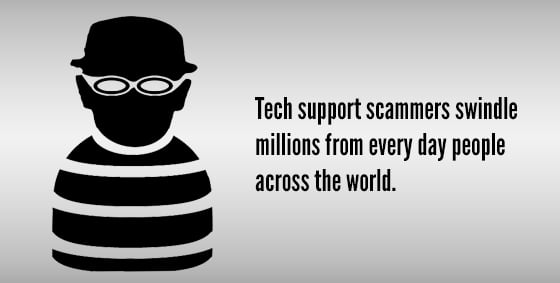
25 Oct How To Spot A Tech Scam Before You Get Stung
If Your Computer Had A Virus, You’d Want to Know About It ASAP, Right?
Tech scammers know we’d be lost without our computers, and that we don’t always know w hat’s going on behind the screen. In effect, they’ve been able to swindle millions from people across the world every day.
hat’s going on behind the screen. In effect, they’ve been able to swindle millions from people across the world every day.
Tech Scams Go Like This
You receive a random phone call from someone with a heavy accent (usually Indian) saying they’re from Microsoft. Pop-ups appear on the screen indicating system is infected with a virus.
Then, to fix the problem, they instruct you to download support software. From here, the technician gives you a special link to use.
Thereafter, a technician uses that software to gain access to your system, and makes it appear as if your system is riddled with viruses. For example, flashing screens, mysterious diagnostics whizzing by, fabricated errors…they’ll do or say anything to invoke panic. Scammers go as far as claiming your system has been infected with illegal content, and can lead to criminal charges.
Finally, scammers will make demands for credit card information. Once paid, scammers stop fiddling with your system to create the illusion that the problem is fixed. To continue the scam, they’ll soon access your system to recreate the problem, this time offering a subscription for ongoing protection.
What To Do If Targeted By Tech Scams?
1. Don’t taunt them. Just hang up. Right now you’re only a phone number in their system and they’ll move onto the next. However, if you give them cause to target you personally, you may find yourself in a dangerous situation.
The real Microsoft will never randomly call people like this. Ever.
2. If a pop-up appears, immediately run an anti-virus scan. Don’t click the pop-up or call the number.
Already A Victim of Scams?
Call your financial institution and have the charges reversed and your card reissued. It’s easier than you might think and helps the authorities locate the scammers.


